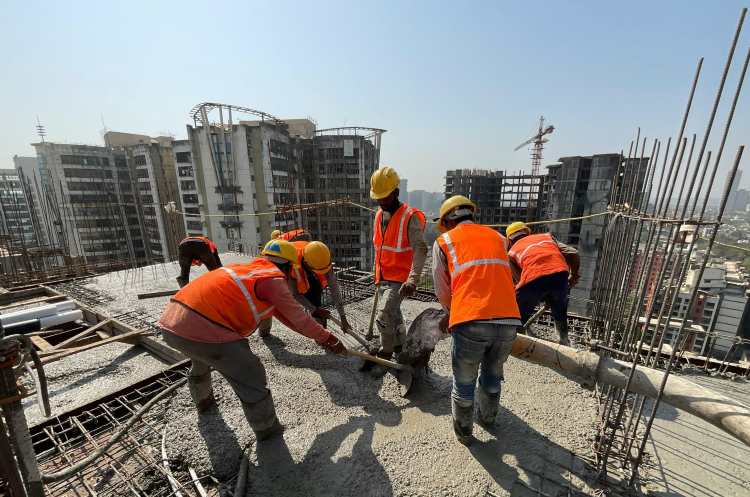
Inter-state migrant labourers are a group whose hardships have largely remained unaddressed in India. The situations which have starkly exposed their suffering, fragmentation, exclusion and heightened vulnerabilities include the recent India-Pakistan war-like situation, and the impending migration crisis due to climate change related natural disasters.
Following the India-Pakistan hostilities in May this year, a significant number of migrant workers in Ludhiana chose to return to their home states in Uttar Pradesh and Bihar.
As the crisis escalated, characterised by the presence of advanced weaponry like drones and missiles, blackout orders, and rising public anxiety, posts on social media platforms revealed that migrant workers were leaving industrial zones in Punjab.
Concerns regarding safety, uncertainties around their livelihood, and memories from the Covid-19 pandemic were some of the reasons that compelled them to head back home.
Their mass departure, however, triggered apprehensions among Punjab-based industrialists who were anxious about the potential collapse of their operations due to the sudden and significant labour shortage.
The debates on X were revealing, and the opinion was split. Some users criticised migrant labourers for being ungrateful for “leaving the state which gave them livelihood”; they turned it into an issue of false bravado, arguing that even as the brave locals on the India-Pakistan borders were standing their ground, the migrants were leaving the state.
Other users, though, sympathised with the precarity of the situation of the workers.
Despite the support, the criticism of the workers raises important legal and ethical questions about their treatment in India, and calls for attention to their vulnerabilities, especially during a crisis.
READ I Trade deficit falls, but crude price risk persists
Outdated, ineffective laws
Currently, the Inter-State Migrant Workmen (Regulation Of Employment And Conditions Of Service) Act, 1979, stands as the primary — albeit increasingly outdated — legislation intended to safeguard the interests of migrant workers.
The Act defines a migrant worker as “any person who is recruited by or through a contractor in one State under an agreement or other arrangement for employment in an establishment in another State, whether with or without the knowledge of the principal employer in relation to such establishment.”
However, this law is toothless and ill-equipped to address the realities faced by migrant workers in crisis situations such as armed conflicts, climate change induced natural disasters, or a pandemic.
For instance, the law is silent on emergency provisions for evacuation of such workers, government assistance during crisis, guidelines for safe relocation of such workers back to their home states, and the duties of employers towards ensuring the safety of such workers.
The prevalence of a large number of undocumented migrant workers only compounds these challenges. It hindered workers from accessing government assistance during the Covid-19 pandemic, and disabled the government from generating effective policy responses and aid distribution.
The hardships faced by migrant workers and their family members, especially women and children migrants, during the COVID-19 pandemic were severe. The issue was discussed in the 2020 International Labour Organisation (ILO) Report which pointed out the lack of proper laws for inter-state migrant workers in India.
The ILO report also exposed the blatant systemic challenges endured by such workers owing to deficient social protections, forced labour, region-based discrimination, disproportionate burden borne by women, inter-generational transfer of poverty to children, and extreme vulnerability during disasters and crises.
It noted that the lived realities of these workers sharply contradicted the egalitarian ideals enshrined in the Indian Constitution and labour legislations, and emphasized the need for developing a policy framework for institutionalising aid agencies, partnering with civil society organisations and including obligations of employers and government agencies for improving the legal and social status of such workers.
Despite this report, similar vulnerabilities of migrant labourers were visible again during the recent India-Pakistan hostilities highlighting that little has been done till date to address their precarious position.
In the aftermath of the Covid-19 pandemic, the government had amended and reintroduced the Occupational Safety Health and Working Conditions Code, 2020 to include special provisions for migrant workers.
The Code now includes a dedicated chapter for inter-state migrant workers, mandates the establishment of a toll-free helpline, requires their registration in the receiving states, integrates them within contract labour, and provides for portability of benefits such as ration cards from home states to destination states.
However, this Code remains a dead letter. It lacks express provisions for state governments and employers for assisting workers in times of crises.
This bare minimum legal reform also remains largely ineffective due to the lack of clarity on the enforcement of this Code due to several issues, including incomplete rule-making by states, opposition from the labour segment and trade unions, and concerns about the potential impact on businesses.
Migrant labour: Are they disposable
The present situation thus raises two critical questions: What is the role of the central and state governments in protecting migrant labourers? And, more importantly, what are the responsibilities of the employers in such times?
The frustration and anxieties of the industrialists in the recent India-Pakistan crisis suggests that the prevalent business model sees labour only as a tool rather than as people with rights.
At the same time, the government’s failure to revise the 1979 Act, or to effectively enforce the 2020 OSH Code, highlights bureaucratic lethargy, administrative unwillingness, and a lack of political will.
Incorporating robust and crisis-specific protections for inter-state migrant workers is on the governments’ longlist since as non-voters, migrant workers have little political voice.
The public in industrialised states, likewise, sees migrants as disposable labour force. However, this is not a labour issue. It’s a human rights issue. And it is time the law and society recognised it as such.
Ashima Sharma is Assistant Professor at the School of Law, BML Munjal University. Her research interests include labour laws and animal rights law. This article appeared first on 360.
